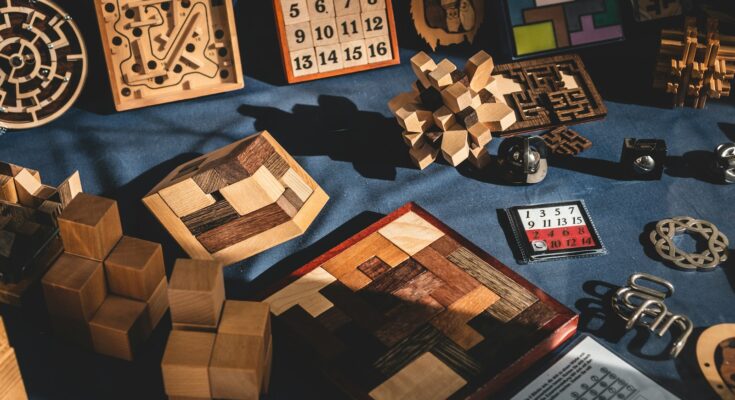Strategic thinking is a valuable skill that helps you make better decisions, solve problems, and plan for the future. It’s not just for business leaders or chess players—anyone can develop this skill with practice. One fun and effective way to improve your strategic thinking is by playing puzzle games. These games challenge your brain, encourage creativity, and teach you to think ahead. In this article, we’ll explore how puzzle games can boost your strategic thinking and share tips to get the most out of them.
What is Strategic Thinking?
Strategic thinking is the ability to analyze situations, plan for the future, and make decisions that lead to success. It involves:
- Problem-solving: Finding solutions to challenges.
- Planning: Thinking ahead and preparing for different outcomes.
- Decision-making: Choosing the best course of action.
- Adaptability: Adjusting your plans when things don’t go as expected.
Strategic thinking is useful in many areas of life, from managing your time to achieving long-term goals. Puzzle games are a great way to practice these skills in a low-pressure, enjoyable way.
Why Puzzle Games?
Puzzle games are more than just entertainment. They require you to think critically, plan your moves, and adapt to new challenges. Here’s how they help improve strategic thinking:
- They Challenge Your Brain: Puzzle games often involve complex problems that require logical thinking and creativity.
- They Teach Patience: Solving puzzles takes time and persistence, which are key to strategic thinking.
- They Encourage Planning: Many puzzle games require you to think several steps ahead.
- They Improve Focus: Concentrating on a puzzle helps you stay focused on your goals.
- They Build Confidence: Successfully solving puzzles boosts your problem-solving skills and self-esteem.
Types of Puzzle Games to Try
There are many types of puzzle games, each offering unique challenges. Here are some popular ones to try:
- Chess: A classic strategy game that requires planning, foresight, and adaptability.
- Sudoku: A number puzzle that improves logical thinking and attention to detail.
- Crossword Puzzles: These enhance vocabulary and problem-solving skills.
- Rubik’s Cube: A 3D puzzle that improves spatial awareness and patience.
- Jigsaw Puzzles: These help with visual-spatial reasoning and focus.
- Escape Room Games: These require teamwork, creativity, and quick thinking.
- Tetris: A fast-paced game that improves decision-making and hand-eye coordination.
- Strategy Video Games: Games like Civilization or Age of Empires teach resource management and long-term planning.
How Puzzle Games Improve Strategic Thinking
Let’s dive deeper into how puzzle games can sharpen your strategic thinking skills:
1. Enhancing Problem-Solving Skills
Puzzle games present you with challenges that require creative solutions. For example, in a game like Tetris, you must quickly decide where to place falling blocks to clear lines. This trains your brain to think on its feet and find solutions under pressure.
2. Encouraging Long-Term Planning
Games like chess or Civilization require you to think several moves ahead. You must anticipate your opponent’s actions and plan your strategy accordingly. This skill translates to real-life situations, such as planning a project or setting career goals.
3. Improving Decision-Making
Puzzle games often force you to make quick decisions with limited information. For example, in Sudoku, you must decide which number fits in a cell based on the clues available. This helps you become more confident in your decision-making abilities.
4. Building Adaptability
Not every plan works out, and puzzle games teach you to adapt. For instance, if your strategy in a jigsaw puzzle isn’t working, you might need to try a different approach. This flexibility is crucial for handling unexpected challenges in life.
5. Boosting Focus and Concentration
Solving puzzles requires sustained attention. Whether you’re piecing together a jigsaw puzzle or solving a crossword, you need to stay focused. This improves your ability to concentrate on tasks and avoid distractions.
6. Developing Patience and Persistence
Puzzle games can be frustrating, but they teach you to keep trying. For example, solving a Rubik’s Cube might take many attempts, but each failure brings you closer to success. This persistence is essential for achieving long-term goals.
Tips to Improve Strategic Thinking with Puzzle Games
To get the most out of puzzle games, follow these tips:
1. Choose the Right Games
Pick games that challenge you but aren’t too difficult. Start with simpler puzzles and gradually move to more complex ones as your skills improve.
2. Set Goals
Before starting a game, set a goal. For example, aim to solve a Sudoku puzzle in under 10 minutes or complete a jigsaw puzzle in one sitting. Goals keep you motivated and focused.
3. Analyze Your Mistakes
When you make a mistake, take time to understand why. Did you rush your decision? Did you overlook a clue? Learning from your mistakes helps you improve.
4. Think Ahead
Practice thinking several steps ahead. In chess, for example, try to predict your opponent’s moves and plan your strategy accordingly.
5. Stay Patient
Don’t get discouraged if you can’t solve a puzzle right away. Take breaks if needed and come back with a fresh perspective.
6. Play Regularly
Consistency is key. Set aside time each day or week to play puzzle games. The more you practice, the better you’ll get.
7. Challenge Yourself
Once you master a game, try a harder version or a new type of puzzle. Constantly challenging yourself keeps your brain sharp.
8. Play with Others
Some puzzle games, like escape rooms or strategy board games, are more fun with others. Playing with friends or family can improve your teamwork and communication skills.
Real-Life Applications of Strategic Thinking
The skills you develop through puzzle games can be applied to real-life situations. Here are some examples:
- Work: Strategic thinking helps you plan projects, manage time, and solve problems at work.
- School: It improves your ability to study effectively, complete assignments, and prepare for exams.
- Personal Goals: Whether you’re saving money, learning a new skill, or planning a trip, strategic thinking helps you achieve your goals.
- Relationships: It improves your ability to communicate, resolve conflicts, and make decisions with others.
Conclusion
Puzzle games are a fun and effective way to improve your strategic thinking. They challenge your brain, teach you to plan ahead, and help you become a better problem-solver. By playing these games regularly and following the tips in this article, you can develop skills that will benefit you in all areas of life. So, the next time you’re looking for a way to pass the time, pick up a puzzle game and start sharpening your mind!
Remember, strategic thinking is a skill that takes time to develop, but with practice, you’ll see improvements. Whether you’re solving a crossword, playing chess, or tackling a Rubik’s Cube, every puzzle you solve brings you one step closer to becoming a better strategic thinker. Happy puzzling!



